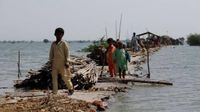A significant warning has emerged from a recent United Nations report, indicating that major cities in the Global South, specifically Karachi and Dhaka, will face a massive influx of climate migrants by the year 2050. Conducted by the United Nations Economic and Social Commission for Asia and the Pacific (UN-ESCAP), the report, titled Urban Transformation in Asia and the Pacific: From Growth to Resilience, underscores the dire challenges these urban centers will encounter as they grapple with the ramifications of climate change.
Forecasts from the study indicate an alarming reality: if global temperatures exceed the critical threshold of 1.5°C above pre-industrial levels, two of the ten cities projected to be hardest hit will be Karachi and Dhaka, together expecting an influx of 5.4 million climate migrants. Specifically, Dhaka is anticipated to receive about 3.07 million new residents due to climate factors, while Karachi will see an influx of approximately 2.4 million migrants by 2050.
The report highlights that cities like Karachi, already beleaguered by unplanned urbanization and weak infrastructure, are particularly vulnerable. Karachi's capacity to manage increased populations is under threat, given its existing struggles with fragmented governance and poor urban planning. With the August 2020 floods acting as a stark reminder of these governance issues, Karachi faced significant damage compared to better-managed cities like Lahore.
Additionally, the report points to overarching trends impacting the Asia-Pacific region, which is home to 66.6 million migrants. By 2050, the urban population in this region is projected to skyrocket by 1.2 billion, with global warming exacerbating challenges such as water shortages, extreme heat, and land subsidence. These factors are crucial for megacities like Karachi and Dhaka that are already wrestling with resource allocation and urban management.
UN-ESCAP underscores in its findings that addressing these impending crises requires comprehensive governance and climate adaptation policies modeled on cooperation among regional governments. "If global temperatures rise beyond 1.5°C above pre-industrial levels, around 8 million people will be forced to migrate to 10 cities across the Global South," the report notes, reflecting the urgent need for measures to mitigate these impacts.
Experts are calling for reinforced efforts towards improving urban climate resilience across Asia-Pacific cities. Historical precedents reveal that cities with strong governance frameworks, such as Lahore, can manage climate impacts more effectively, thus avoiding the severe disruptions that naïve urban management can provoke.
The challenges posed by climate change demand that governments not only take immediate actions towards emergency adaptation strategies but also lay groundwork for long-term sustainability. Authorities are urged to build resilient urban frameworks that can better withstand future crises. With cities expected to become significantly more populated, failing to address these issues may lead to overwhelming conditions that threaten safety and well-being.
Improving infrastructure, ensuring equitable resource distribution, and developing sustainable urbanization practices are crucial steps required by government entities tasked with managing these transitions. The report emphasizes a collaborative approach, calling for countries within the region to strengthen their cooperation and share best practices in urban resilience and management.
As the world inches closer to 2050, the complexity of climate change impacts grows. The urban migration crisis, particularly in vulnerable cities like Karachi and Dhaka, presents unprecedented challenges that demand immediate attention and innovative solutions. Not only must immediate adaptation measures be identified, but strategies for managing substantial incoming climate refugee populations must also be prioritized to maintain social stability.
The UN-ESCAP session scheduled for April 2025 in Bangkok will further explore these findings and seek pathways for implementing actionable reforms to aid the cities and their populations facing these ominous forecasts. Addressing climate change is not optional; it is a vital necessity for the future viability of countless urban centers.
In summary, rising global temperatures may not just change the climate but also significantly alter the demographics of urban centers in the Global South. Cities like Karachi and Dhaka, which are already strained, must be prepared to adapt comprehensively to manage the anticipated influx of climate migrants. The urgency of collective action against climate change is more apparent than ever, and the time to act is now.


